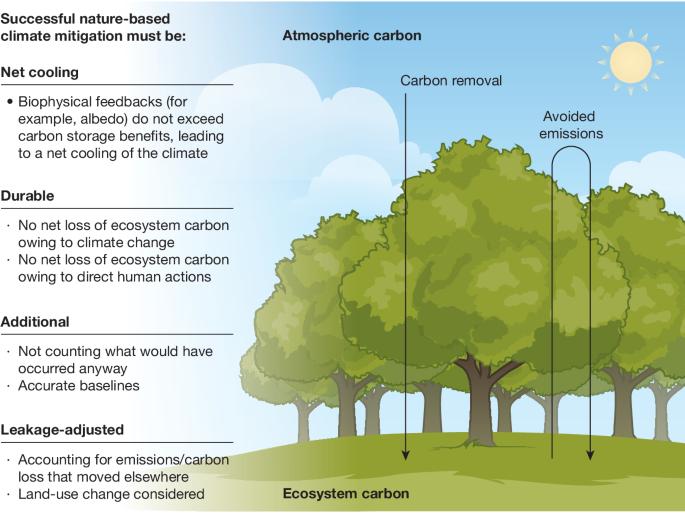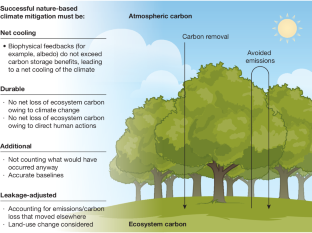在全球森林中寻求更有效的基于自然的气候解决方案
IF 48.5
1区 综合性期刊
Q1 MULTIDISCIPLINARY SCIENCES
引用次数: 0
摘要
陆地生态系统可通过旨在减少生态系统温室气体排放和/或增加生态系统碳储量的基于自然的气候解决方案(NbCS)为减缓气候变化作出贡献。森林具有最大的国家碳减排潜力,与更广泛的可持续性效益相一致,但不幸的是,大量文献揭示了森林国家碳减排项目和协议中普遍存在的问题,这些问题破坏了森林碳信用额的气候减缓,阻碍了实现全球净零排放的努力。因此,未来有必要引入更好的科学和政策,以改善国家和地区减缓气候变化的成果。在此,我们综合了记入森林国家森林控制指标的挑战,并提供指导和关键的后续步骤,以便立即和短期内改进这些战略的实施。我们围绕严格的森林NbCS的四个关键组成部分构建了我们的观点,阐明了关键的科学和政策考虑因素,并提供了提高严谨性的解决方案。最后,我们概述了一种“贡献方法”,以支持严格的森林NbCS,这是一种不允许补偿或抵消索赔的替代资金机制。本文章由计算机程序翻译,如有差异,请以英文原文为准。


Towards more effective nature-based climate solutions in global forests
Terrestrial ecosystems could contribute to climate mitigation through nature-based climate solutions (NbCS), which aim to reduce ecosystem greenhouse gas emissions and/or increase ecosystem carbon storage. Forests have the largest potential for NbCS, aligned with broader sustainability benefits, but—unfortunately—a broad body of literature has revealed widespread problems in forest NbCS projects and protocols that undermine the climate mitigation of forest carbon credits and hamper efforts to reach global net zero. Therefore, there is a need to bring better science and policy to improve NbCS climate mitigation outcomes going forward. Here we synthesize challenges to crediting forest NbCS and offer guidance and key next steps to make improvements in the implementation of these strategies immediately and in the near-term. We structure our Perspective around four key components of rigorous forest NbCS, illuminating key science and policy considerations and providing solutions to improve rigour. Finally, we outline a ‘contribution approach’ to support rigorous forest NbCS that is an alternative funding mechanism that disallows compensation or offsetting claims. A strategy to improve the implementation of nature-based climate solutions in global forests for climate mitigation is described, comprising four key components to highlight notable science and policy considerations and providing solutions to improve rigour.
求助全文
通过发布文献求助,成功后即可免费获取论文全文。
去求助
来源期刊

Nature
综合性期刊-综合性期刊
CiteScore
90.00
自引率
1.20%
发文量
3652
审稿时长
3 months
期刊介绍:
Nature is a prestigious international journal that publishes peer-reviewed research in various scientific and technological fields. The selection of articles is based on criteria such as originality, importance, interdisciplinary relevance, timeliness, accessibility, elegance, and surprising conclusions. In addition to showcasing significant scientific advances, Nature delivers rapid, authoritative, insightful news, and interpretation of current and upcoming trends impacting science, scientists, and the broader public. The journal serves a dual purpose: firstly, to promptly share noteworthy scientific advances and foster discussions among scientists, and secondly, to ensure the swift dissemination of scientific results globally, emphasizing their significance for knowledge, culture, and daily life.
 求助内容:
求助内容: 应助结果提醒方式:
应助结果提醒方式:


